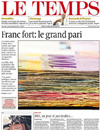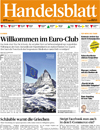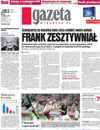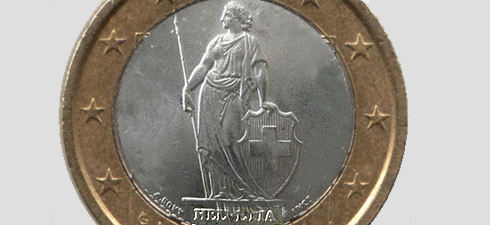“The nuclear option,” which established a fixed exchange rate of SFr1.20 to the euro, amounts to what the Le Temps headline describes as a "major gamble." For the Geneva daily, the decision...

... is a head-on challenge to the logic that has motivated financial markets to seek refuge [in the Swiss franc] from a euro that is on the verge of collapse and a dollar dragged down by gigantic debts and deficits. The SNB is right to assume that any semblance of stability in the Eurozone and the US economy is highly unlikely in the medium term. For exporting businesses, the surge in the value of the Swiss franc had been so violent and rapid [since the start of this year, the currency has gained 11% against the euro and more than 15% against the dollar] that it had become poisonous and unbearable. – Le Temps
“Welcome to the euro-club,” announces Handelsblatt, which illustrates its headline with a photomontage showing the EU flag at the foot of the Matterhorn. For the Dusseldorf business daily, the SNB’s decision will mark “the end of an era. Switzerland, which has always set great store on its independence, has linked its currency to the euro. Exporting industries were unable to cope with all of the suffering caused by a strong franc.” Conservative daily Die Welt remarks that “there will be no more islands” in Europe. The newspaper continues -

... For years Switzerland has benefitted from a special status of conferred by low taxes on capital, inviolable banking secrecy, and a stable economy” — that is until “the excessive strength of the national currency became an existential threat to exports and tourism. The SNB is right to assume that any semblance of stability in the Eurozone and the US economy is highly unlikely in the medium term. For exporting businesses, the surge in the value of the Swiss franc had been so violent and rapid [since the start of this year, the currency has gained 11% against the euro and more than 15% against the dollar] that it had become poisonous and unbearable. – Handelsblatt
“The franc braces itself,” headlines Gazeta Wyborcza, which notes that “the Swiss government took everyone by surprise, when it pegged the exchange rate for its currency and announced that it would defend it to the end.” For the Warsaw daily -

... This intervention is an act of desperation by the SNB, which has tried for months to devalue the franc. A strong currency means in effect that "made in Switzerland" is expensive to export, that Swiss companies are laying people off, that the Swiss are going to shop in neighboring countries, which have become cheaper. What weapons does the SNB have at its disposal? First, huge financial reserves, then it can also run the money printing machines. This is what central banks in Central Europe and the US do when they need more cash to buy treasury bonds of countries at risk of bankruptcy. – Gazeta Wyborcza
Was this article useful? If so we are delighted!
It is freely available because we believe that the right to free and independent information is essential for democracy. But this right is not guaranteed forever, and independence comes at a cost. We need your support in order to continue publishing independent, multilingual news for all Europeans.
Discover our subscription offers and their exclusive benefits and become a member of our community now!












